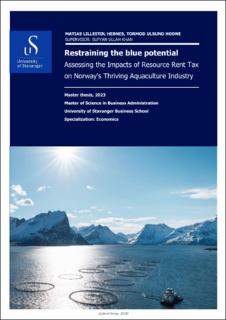| dc.description.abstract | This thesis analyses the effects on investment incentives of implementing a resource rent
tax in the Norwegian aquaculture industry. As the second largest sector in the country, it is
essential to design a fair and sustainable tax system that avoids distorting financial
decisions, ensuring long-term growth and development.
The proposed resource rent tax aims to capture economic rents derived from natural
resource extraction, giving the public a larger share of generated profits. A mixed-method
approach is employed, combining qualitative text analysis and quantitative net present
value analysis of hypothetical investment projects, accompanied by sensitivity analysis.
This comprehensive method sheds light on how the resource rent tax will impact investment
incentives in the industry.
The findings offer clear evidence that the resource rent tax affects investment incentives.
First, we analyze the responses to the consultation letter, exploring stakeholder views and
highlighting potential effects on industry growth, investment incentives, municipalities,
and environmental development. Secondly, we assess how investment incentives may
change and how the resource rent tax will affect aquaculture projects’ profitability and
financial feasibility.
The research identifies several factors influencing investment incentives, including the tax
level and structure, required investor returns, and market conditions. Furthermore, it
discusses the potential implications of these findings on industry growth.
The outcomes of this study provide valuable insights and recommendations for
policymakers, industry stakeholders, and potential investors in the aquaculture industry.
The study contributes to a deeper understanding of how the suggested resource rent tax
may shape investment incentives. It offers guidance for designing a tax framework that
balances revenue generation and industry growth. This thesis contributes to the ongoing
discussion surrounding the implementation of resource rent taxation in the aquaculture
industry and provides a foundation for further economic and growth analysis. | |
